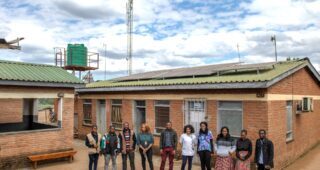Meet Sarah: A Woman Leading a Health Facility to Rethink How We Provide Quality and Dignified Care in Uganda
From a young age, Sarah Atuhairwe knew her calling was medicine. “My mother recently reminded me that when I was little, I would play health worker, mixing up grasses I found and pretending to treat my siblings with them.”

Many years later, Sarah is a recognized leader in her home district of Mbarara, Uganda, both as a midwife and as the In-Charge at a health facility. Her commitment to her patients and her team has enabled her facility to improve its performance and quality of care—as of Spring 2018, 100% of pregnant women attending antenatal care (ANC) were tested for HIV, 100% of HIV-positive pregnant women at the facility received antiretrovirals (ART) during ANC, 91% of HIV-positive clients on ART had an updated viral load test and 92% of those patients were virally suppressed, meaning their virus was undetectable.

Crediting her success to staying flexible, organized, and the trainings and mentorships provided by the Elizabeth Glaser Pediatric AIDS Foundation (EGPAF), she has found fostering teamwork to be the most successful and rewarding tactic.
While leading an EGPAF-supported health facility, Ruti, she instituted mandatory monthly meetings and paid out of her own pocket for special lunches for her team. She also led netball games with her team in the facility compound.
Being in charge of a facility has taught me so much. I’ve gained managerial skills, matured, and learned how people relate and react to things.
Sarah takes the time to make sure each of her colleagues feel like an integral member of the team, and is committed to the overall success of the facility. Sarah worked closely with the peer mentor—a former commercial sex worker—to support and empower her to design a patient outreach plan. She also implemented an innovative strategy to support her clients who were uncomfortable disclosing their HIV status to their partners. The individual would return to the facility with their partner, and Sarah and her team would act as though they were testing both individuals for the first time. These strategies allowed Ruti Health Facility to have a high with 97% of their HIV-positive clients linked to care.

Her work, of course, is not without challenges. Until recently, she was one of three full-time staff members supporting a facility that can see over 800 patients a month. The heavy client flow caused her to work longs hours—and most weekends. The facility is also located in an urban area that serves a high number of key and vulnerable populations, requiring additional attention.
In order to stay motivated, Sarah takes time to put herself in the shoes of her patients.
“It would be easy to hide inside my office, but I think about how I would feel if I was a sick person or pregnant mother coming to my facility. How would I feel if I came at 8:00 and wasn’t seen until noon?”
When feeling tired or overwhelmed, Sarah grabs one of the medical books at the facility and takes a few quiet minutes with a cup of tea in her office to regroup and reenergize herself. She also finds support from her husband, an administrator at a hospital in Eastern Uganda. They share work challenges and brainstorm solutions together, and encourage each other’s leadership growth.


Her commitment to her team and her patients has not gone unnoticed. In January 2017, the Uganda State House awarded her facility a certificate of merit, one of only two facilities in the region to receive it.
“Sarah is an exceptional leader. She is willing to learn, and implement what she has learned. When handling vulnerable and at-risk populations, she is passionate and committed to their care, always approaching them with a non-judgmental attitude. Sarah and her team have put in the extra effort to attract clients to their facility through quality services and constant self-evaluation.” – Assistant District Health Officer, FP for MCH and PMTCT, Mbarara, Agatha Nshabohurira.
Through her work, Sarah has developed a particular passion for maternal care. She hopes to return to school and pursue a diploma program, which she is sure will allow her to grow to be an even more effective and impactful leader and health worker.
Emma Bradford, Knowledge Management Officer, Global Health Corps Fellow, Uganda
Uganda
Strengthening Local Capacity



